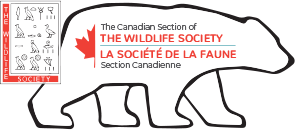
We collect basic website visitor information on this website and store it in cookies. We also utilize Google Analytics to track page view information to assist us in improving our website.
In 1977, to promote and strengthen professional standards amongst wildlife biologists, TWS initiated the Wildlife Biologist Certification Program. The program judges prospective applicants based on 4 considerations:
Education Depth
Experience as a practicing professional
TWS membership
A commitment to TWS's Code of Ethics
To ensure the education and professional experience requirements were being met, TWS established the Certification Review Board (CRB). The CRB is an eight-member board with representation from Canada and 7 other TWS sections across the US.
TWS is the only organization providing a peer-reviewed certification for wildlife biologists. TWS has been responsible for the creation of 1,600 Certified Wildlife Biologists® (CWB®), primarily across Canada and the USA.
/Chantal Maclean toad.png) Photo: Chantal Maclean
Photo: Chantal Maclean
An individual who has met the education requirements but has not yet obtained at least 5 years of professional-level wildlife experience in the previous 10 years to qualify as a Certified Wildlife Biologist® (CWB ®) can apply to be designated as an Associate Wildlife Biologist® (AWB®).
There are several ways that TWS members can become certified
Biologists with 20 years of experience can use experience instead of required coursework.
Establishes a rigorous standard and quality control for Wildlife Biology and Management practices
Enhances the credibility of the profession of wildlife biology
Builds commitment to the wildlife profession beyond employment
Advances regulation of wildlife biology occupations
Facilitates communication and sharing of best practices across jurisdictions
Eliminates jurisdictional barriers when working anywhere in Canada
Ensures that appropriate wildlife biology-related courses and training by students/young professionals.
Provides a definite hiring asset for wildlife-related jobs
Facilitates communication with other resource-based professionals.
Provides leadership in promoting the conservation of natural resources.
/Jessica Lang_Shoreline at Beattie park.jpeg) Photo: Jess Lang
Photo: Jess Lang
One of the requirements of both the Associate and Certified Wildlife Biologist certification application process includes having a Certified Wildlife Biologist (CWB) to act as a reference. The CSTWS certification mentorship program was designed to help connect TWS members with Certified Wildlife Biologists in Canada, who can fill a mentorship role and assist with the reference requirement. Currently, we have CWB mentors in all provinces, except P.E.I, Nova Scotia, and Newfoundland & Labrador. In addition, we have representation in Yukon.
Students/biologists who are interested in participating in our mentorship program should forward the following information to [email protected] :
Based on the information provided, we will reach out to Canadian CWBs and pair the TWS member with a CWB. Once the pairing is completed then the dialogue can begin. The student/biologist gets the benefit of sage advice from a seasoned CWB, and the CWB gets to know the student/biologist, so they can feel comfortable acting as a CWB reference. Another hidden advantage of this mentorship program is the potential for the establishment of a long-term connection between two TWS members.
In 2021, the Terms of Reference (ToR) for the Certification Committee was revised to expand representation to include the 6 professional organizations involved with safeguarding fish and wildlife populations, ecosystems, and environments (see below):
The Wildlife Society (TWS)
The American Fisheries Society (AFS)
The Ecological Society of America (ESA)
Environmental Careers Organization of Canada (ECO Canada)
British Columbia College of Applied Biologists (BC-CAB)
Alberta Society of Professional Biologists (ASPB)
The Certification Committee membership has representatives from TWS, ECO Canada, BC-CAB, and ASPB and is working on connecting with the AFS and ESA. At present, we are actively involved with ECO Canada, BC-CAB, and ASPB.
For the past few years, ECO Canada has been a willing partner and is poised to join in any efforts to interact and work with any of the other Certification organizations acting in Canada.
At our November 2019 meeting, the Certification Committee formed a sub-committee to explore ways to better collaborate with BC-CAB. This 3-person committee—Dr. Everett Hanna (BC-CAB Liaison), Dr. Rod Davis (BCTWS Representative), and Don Barnes (Chair)— continue to dialogue about possible options.
At the 2019 ACTWS-CSTWS AGM, Dave Ealey, the Certification Committee’s Liaison person with ASPB, gave a talk and participated in this Certification Committee Workshop. At that time, he was very encouraging that in-roads were possible.
In May 2021, the Certification Committee began the process of dialoguing with ASPB towards providing opportunities for an ASPB member to become certified as a Certified Wildlife Biologist (CWB®).
In 2019, to establish a rapport with the American Fisheries Association (AFS), we reached out to Dr. Mark Poesch, Fisheries Professor at the University of Alberta and former AFS President of the Canadian Aquatic Resource Section. He has been working closely with a fellow professor, Dr. Lu Carbyn, CWB®, to educate and inform students about the certification programs associated with AFS and TWS. Dialogue is still ongoing.
Efforts are being made to connect with ESA through their Canadian Chapter based out of the University of Calgary.
Our future plans involve connecting with AFS and ESA to establish their membership on the Certification Committee. We believe that this professional collective will become a powerful vehicle to promote professionalism in Canada.
For any inquires, questions or to become involved with the Certification Committee, please email us at [email protected]